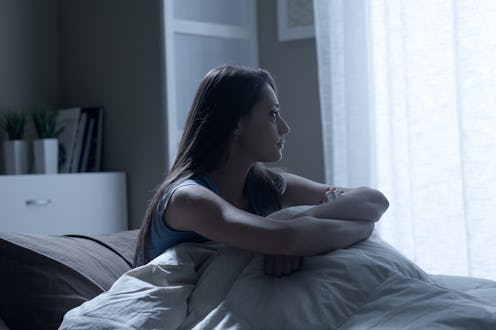Life
6 Signs Your Daytime Sleepiness Is Actually A Sign Of Anxiety

Fatigue that seems to have no cause can be confusing. It's tempting to attribute your sleepiness to something physical, but sometimes, the source may actually be mental. Anxiety is one issue that can cause fatigue, and if you're often tired during the day, you may be exhibiting some signs that your daytime sleepiness is actually anxiety. Everyone experiences anxiety differently, and for some people, their mental state can lead to a feeling of exhaustion.
"Chronic anxiety often results in ongoing feelings of sleepiness, even after a good night’s sleep," clinical psychologist Dr. Carla Manly, tells Bustle. When someone feels anxious all the time, the body’s stress response is activated, releasing certain neurochemicals in the body such as adrenaline and cortisol. Usually, this passes when the anxious situation has ended, but in chronic anxiety, you stay in a perpetually stressed state.
"As a result, the anxiety sufferer may feel constantly drained and fatigued due to remaining in the stressed state despite that fact that no real danger exists," Dr. Manly says. "A sense of 'I’m crashing' or 'My body is crashing' can result from ongoing anxiety."
If you're experiencing daytime sleepiness, it can be useful to try and pinpoint something that may be causing you distress. If you're still not sure, watch out for these six signs your tiredness is actually anxiety.
1You Want To Avoid Certain Thoughts
When worrying gets in the way of your everyday tasks, it can be tempting to tune out and turn off. "Sleeping might be a way of avoiding the feelings of worry and anxiety," clinical psychologist Ellen Braaten, Ph.D., co-director of The Clay Center for Young Healthy Minds at Massachusetts General Hospital, tells Bustle. "Do some thinking about whether you are worried and stressed or whether you are just tired. If worry is something you’re struggling with, it might be causing you problems with sleep." And it may be time to seek help from a professional.
2You're Having Other Unexplainable Symptoms
Anxiety can cause physical symptoms that can make us feel sick, even when we’re not. "Are you experiencing stomach aches, headaches, or nausea that have no physical causes?" Dr. Braaten as. "This could be a sign of anxiety that can contribute to increased sleeping,"
3You Still Feel Sluggish After Enough Sleep
If you're feeling as if you wake up exhausted, even after the recommended seven or eight hours of uninterrupted sleep, it may have something to do with anxiety. "Those who suffer from anxiety disorders often find that they wake up feeling exhausted," Dr. Manly says. "This is due to the toll that stress takes on the body’s resources, affecting the body’s ability to recover and recharge."
4You Have The Urge To Crawl Into Bed Even When Socializing
Feeling the urge to crawl into your bed, even when you're interacting with co-workers or out with friends, could be a sign of anxiety. "Anxiety can create a desire to retreat to a place that feels safe and less stressful," Dr. Manly says. "Feelings of sleepiness can be a signal from the body and mind that a long 'time out' is needed to recover. However, rest isn’t effective as the individual unconsciously repeats the anxious thoughts and behaviors day after day."
5Just The Thought Of Socializing Makes You Tired
The thought of events or situations that cause you anxiety, such as a business event or party, can make you tired. "When a person thinks of an anxiety-inducing situation, the body can actually respond with a fight-or-flight response," Dr. Manly says. "Thus, weariness can result from the mere the thought of an upcoming stressful event."
6Your Thoughts Aren't Sharp
When you feel constantly apprehensive, this drain affects your thinking processes. "Mental acuity is affected by chronic anxiety," Dr. Manly says. "The brain simply doesn’t function as clearly when the body is stressed and tired. Additionally, chronically anxious individuals sometimes 'zone out' into sleepy states simply to get a break from anxious thoughts and feelings."
Unmanaged anxiety can lead to feelings of sleepiness, but to get to the root of your daytime fatigue, it's best to see a doctor who can give you the most accurate diagnosis.